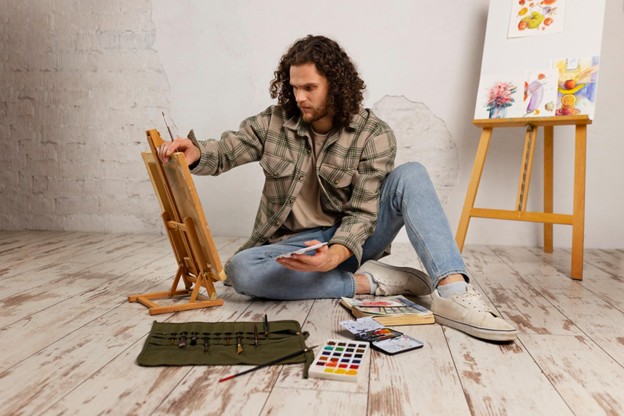In a world running on deadlines and digital noise, hobbies remain one of the last human sanctuaries — places where you aren’t performing, monetizing, or optimizing. Just doing. For the sake of doing. Whether it’s a dusty guitar or a curiosity about astronomy, that first step toward a hobby can reset your attention span, rewire your patience, and remind you that you’re more than your output. Let’s explore seven categories of hobbies — creative, physical, intellectual, experiential, communal, educational, and holistic — each offering something different, each worth beginning, no matter your current bandwidth or skill set.
Paint Clay Code as Creative Practice
Creativity isn’t a luxury — it’s a pressure valve. Whether you’re sketching from your kitchen table or tinkering with a DIY electronics kit, the goal isn’t brilliance; it’s relief. Engaging in visual art, writing, or even unconventional creativity like coding can quiet the noise of stress, offering a mental release that feels both active and calming. No formal training is needed. Just pick a medium, set a 20-minute timer, and begin. Resist the urge to document it. The outcome doesn’t need to be good — it just needs to be yours.
Moving Bodies Moving Minds
You don’t need a gym membership or marathon ambition to make movement a hobby. Think: evening walks with no phone, backyard yoga, beginner dance classes. What these have in common is rhythm — a full-body pattern that recalibrates a frazzled mind. Studies show that even light, regular activity can boost brain health through movement by increasing oxygen flow and releasing neurotrophic factors tied to focus and memory. Want a next step? Try stacking it with something you already enjoy — like podcasts or playlists — to make consistency easier.
Playing With Thought for Its Own Sake
It’s easy to treat thinking as something you do for work, not pleasure. But intellectual hobbies — reading philosophy, learning chess, following niche scientific newsletters — allow you to play with ideas, not just respond to them. Activities like these promote executive functioning and brain health in ways passive consumption never could. Start small. Pick a question you’ve always carried but never chased. “Why do we dream?” “How did alphabets evolve?” The goal isn’t mastery. It’s the joy of being curious again, without an endgame.
Lifestyle as an Ongoing Hobby
Some hobbies aren’t tasks — they’re environments. Gardening, cooking new cuisines, meditating, keeping a ritual tea practice — these don’t entertain you. They shift how you occupy a day. For example, meditation doesn’t just calm the mind in theory. Practicing daily, even for five minutes, has shown real benefits of meditation for mind and body, from blood pressure regulation to reduced reactivity. And cooking? Try one new meal a week. No pressure. No tracking. Just participation in something sensory and full of rhythm.
Building Belonging Through Shared Interests
You know that soft buzz after finishing a group project that worked? That’s not coincidence — it’s chemical. Social hobbies like team sports, book clubs, volunteering, or community art projects activate brain circuits linked to bonding, motivation, and long-term well-being. Hobbies like these enhance the health benefits of being with loved ones, not by forcing connection, but by making space for it to happen naturally. Want in? Pick something with regular gatherings, low stakes, and open skill levels. Don’t wait to be “ready.” Show up clumsy and curious — that’s enough.
Treating Education as a Hobby Not a Chore
Structured learning doesn’t have to be career-driven or intimidating. It can be just as much a hobby as painting or journaling. Many adults find that returning to formal study offers both mental satisfaction and personal momentum. Exploring flexible online business programs can be one way to re-engage the intellect without sacrificing time or flexibility. Whether you finish a degree or dabble in one course, the practice of learning with intent — but not pressure — can rekindle your confidence and expand your possibilities.
Balancing the Mix for Mental Wealth
No one hobby will “fix” you. But a small rotation — physical, creative, communal — can act like a nervous system rebalancer. This doesn’t require a total life overhaul. Just a bit of rhythm. Even a modest hobby practice can boost mental, physical, and social health, especially when it spans multiple types of stimulation. Choose one low-effort option per category. Don’t wait for the calendar to clear. The goal isn’t discipline. It’s dosage. Let small experiences accumulate and overlap until they start feeling like you.
You don’t need to commit for life. You don’t need to be great. You don’t even need to be consistent. You just need to begin. Pick one thing that sounds interesting — not perfect, just not boring — and carve out 30 minutes this week to try it. Set a timer. Expect nothing. Let yourself do something inefficient, non-performative, purely for the experience of doing. And if it doesn’t stick? Good. That means you’re experimenting. That means you’re alive.
Guest post by Sue at Biz Aid Central.





